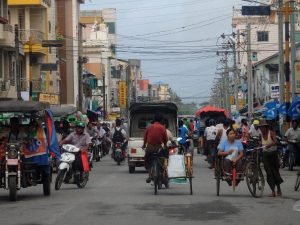Myanmar’s conflict-torn Rakhine State has witnessed a “dramatic rise in hunger” due to the continuing civil war and funding cuts from major foreign donors, including the United States, the U.N. World Food Programme (WFP) said this week.
Rakhine, which borders Bangladesh in Myanmar’s west, has seen some of the most intense fighting in the four years since the military’s seizure of power in February 2021.
In a statement on Tuesday, the WFP said that in central Rakhine, the number of families not able to afford to meet basic food needs had risen to 57 percent, up from 33 percent in December 2024. It said that the situation in the northern part of the state was likely much worse “due to active conflict and access issues.”
The WFP said that reports from its Community Feedback Mechanism also revealed “an alarming rise in distress signals” in Rakhine. “Families are being forced to take desperate measures to survive: rising debt, begging, domestic violence, school drop-outs, social tensions, and even human trafficking,” it stated.
The WFP said that the crisis was “being driven by prolonged conflict, severe movement restrictions, soaring food prices and the reduction of support due to a significant decrease in humanitarian funding.”
Since late 2023, Rakhine State has seen heated battles between the Myanmar army and the Arakan Army (AA), which is fighting to establish an ethnic Rakhine homeland in western Myanmar. The AA claims that it has established effective control over 14 of Rakhine State’s 17 township centers, as well as one township in neighboring Chin State, but the Myanmar military is desperately fighting to hold onto the three coastal townships that are still under its control. This has prompted it to blockade important roads both within Rakhine and between it and neighboring states, closing off vital trade routes.
The situation in Rakhine has been compounded by funding withdrawals, the WFP said, noting that this had forced it to cut lifesaving support to more than 1 million people across Myanmar in April. While the WFP statement did not mention it, a major cause is clearly U.S. President Donald Trump’s decision to gut the U.S. Agency for International Development (USAID) earlier this year. In March, Secretary of State Marco Rubio announced that 83 percent of USAID programs had been permanently cut and that the remaining 17 percent would be managed by the State Department. According to the AFP news agency, the U.S. was the WFP’s largest donor in 2024, funding nearly half of the $9.7 billion of contributions it secured from international donors.
The shuttering of USAID has affected many projects in Rakhine State, where organizations providing healthcare and other support to communities in Rakhine State have reportedly been forced to cease operations. This has also had deleterious impacts on the refugee camps across Rakhine’s border with Bangladesh, which are home to around 1 million Muslim Rohingya, most of whom were driven out of Rakhine State by the Myanmar military in 2017.
In May, Refugees International warned that “drastic U.S. aid cuts – compounded by smaller reductions from other donors – have had widespread negative impacts on the Rohingya community and are undermining prospects for durable solutions for refugees.”
A similar situation prevails at the refugee camps that still dot Thailand’s border with Myanmar. There, hospitals serving more than 100,000 refugees were forced to close after the International Rescue Committee (IRC), which funds the medical clinics, wound up its operations in January due to the withdrawal of U.S. funding.

































